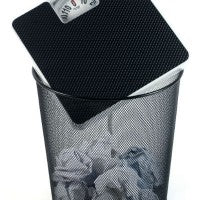A growing need in most American households of our day is weight loss. Many of us are concerned with our weight and the number we see displayed on our scales. But relying on the scale to measure the success of your weight management goals is not the best method! It’s actually even possible for the number on the scale to go up! This is actually quite common, and though the number on the scale has increased, progress can still be occurring!
When a person starts or improves their exercise habits and improves how and what they eat, it makes sense to think that the scale must go down in proportion to the positive changes. Unfortunately, it’s not quite so simple. And when the individual doesn’t see significant weight loss on the scale, they often become discouraged and many lose the motivation to continue with the regimen.
 The problem with focusing weight loss by the number seen on the scale is that a scale can only measure just that: a person’s weight. There are so many variables and the resulting fluctuations that go into how much a person weighs at a given moment in time. Things such as when and what the last meal was, the hydration status, how much fat or muscle mass the individual has, and so forth will influence the amount of weight. Let’s take a closer look at some of the key variables that play a role in weight.
The problem with focusing weight loss by the number seen on the scale is that a scale can only measure just that: a person’s weight. There are so many variables and the resulting fluctuations that go into how much a person weighs at a given moment in time. Things such as when and what the last meal was, the hydration status, how much fat or muscle mass the individual has, and so forth will influence the amount of weight. Let’s take a closer look at some of the key variables that play a role in weight.
Let’s take a look at fat. When a person steps on the scale and sees that the number either hasn’t decreased much, or has even slightly gone up, it is automatically assumed that it’s from fat mass increasing. This isn’t typically the case, especially when exercise and nutrition habits are improving. Losing fat is what we all desire. The unfortunate reality about that is that fat itself is lost at a fairly moderate pace. When weight from the right places is being lost, meaning fat loss, a maximum of about one to two pounds a week should be seen. If too much weight is lost too quickly, such as five or ten or more pounds in a week, then the weight loss is going to be a small amount of fat, but also some pounds from water and possibly muscle, and muscle weight is not something we want to lose! If a person is not very overweight, a more realistic weight loss from fat in a week’s time is more like a half to one pound. If a person is truly sticking to their exercise and nutrition plan, it is highly unlikely that fat mass won’t be impacted!
A second big player that influences a person’s weight in a given moment is the amount of muscle mass. Like fat, muscle mass is gained slowly. When an individual begins exercising (or improves or changes the type, load, or intensity of their workouts), muscles will strengthen and grow. Muscle tissue is dense and weighs more that fat. This means that if you take a pound of muscle and an equivalent amount of fat tissue, while they both weigh one pound, the muscle tissue will take up less space than the fat. It takes more fat tissue to get a full pound. Because fat is lost slowly and isn’t as dense as muscle, when a person who has increased their muscle tissue steps on the scale, it is quite possible that the number has either stayed about the same or possibly even gone up slightly. This is because the individual is changing their body composition, working to decrease the amount of fat while increasing the amount of muscle tissue!
On the flip side, if a person goes on a low calorie diet; stops or decreases exercise or only does primarily cardio; or engages in other such methods to cause weight changes, they might step on the scale and experience weight loss from the body burning up its muscle tissue. Because the scale doesn’t say where the weight is coming from, much of the weight loss in a situation like this comes primarily from lost water and muscle, not from fat!
 Another big factor influencing weight is when and what a person ate recently. If a person weighs himself or herself in the morning before eating anything versus weighing themselves after eating a bowl of oatmeal for breakfast, then the reading is going to be a few pounds different. It’s not because that person suddenly gained a few pounds of fat from breakfast, but because the food and liquid now sitting in the stomach has an influence on the weight reading! This includes water and hydration status; if someone is drinking the daily recommended amount of water, it’s going to cause changes in the indicated weight.
Another big factor influencing weight is when and what a person ate recently. If a person weighs himself or herself in the morning before eating anything versus weighing themselves after eating a bowl of oatmeal for breakfast, then the reading is going to be a few pounds different. It’s not because that person suddenly gained a few pounds of fat from breakfast, but because the food and liquid now sitting in the stomach has an influence on the weight reading! This includes water and hydration status; if someone is drinking the daily recommended amount of water, it’s going to cause changes in the indicated weight.
To conclude, don’t rely on the scale to measure progress, because it simply is not the most accurate way to tell you what your body composition is! It would be far better to weigh 130 pounds and have an ideal muscle to fat mass ratio than to be 100 pounds of primarily fatty tissue! A scale doesn’t tell you where the weight is coming from or what your amount of fat is. Furthermore, the scale can’t show you the progress and improvements you’ve made to your health and fitness! So do yourself a favor as you work towards reaching your ideal body: toss out that scale and focus instead on your body fat percentage!





